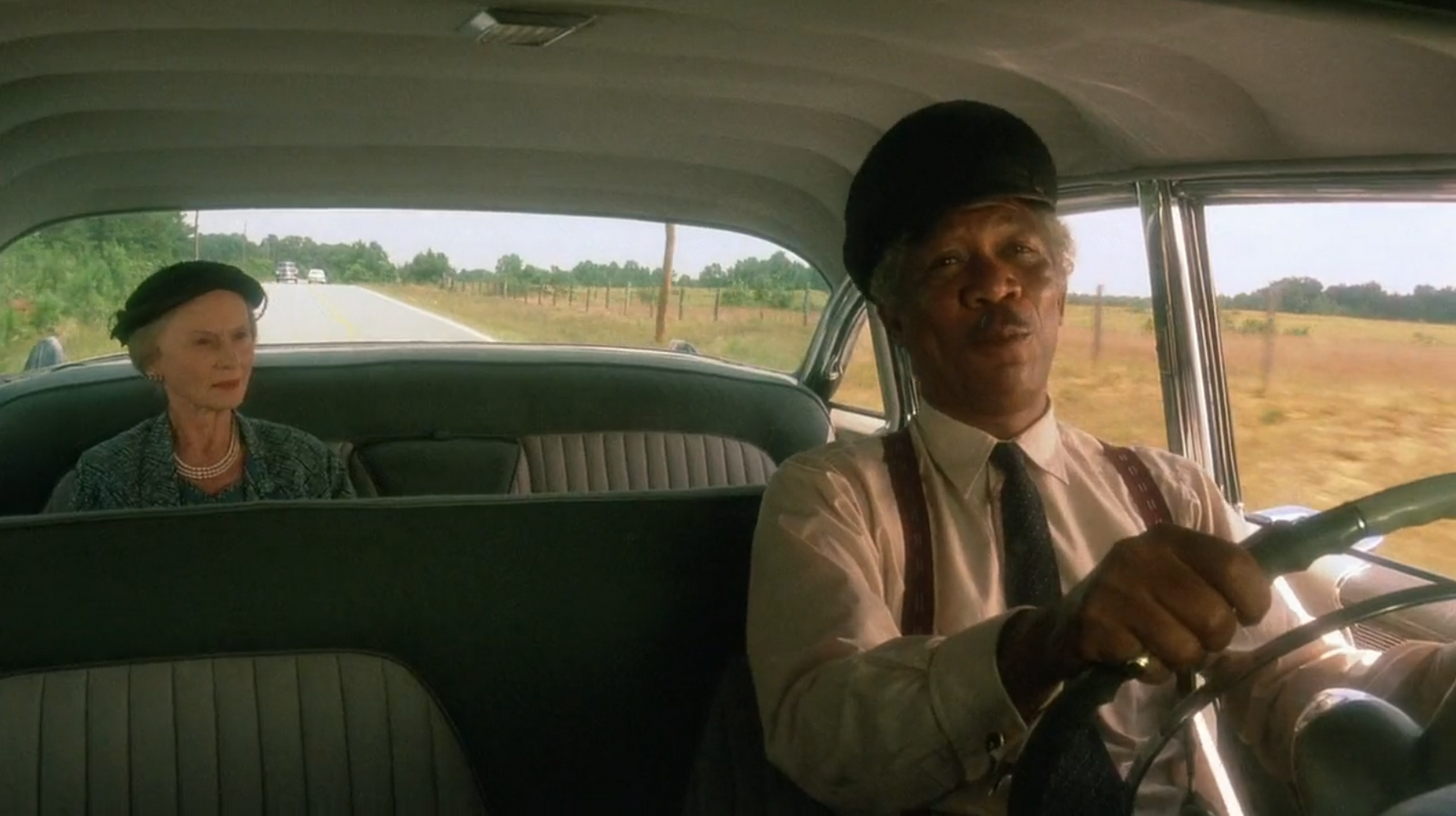← Back to Reviews
in
#112 - Driving Miss Daisy
Bruce Beresford, 1989

In 1950s Georgia, a Jewish businessman hires an old black man to act as a chauffeur for his crotchety mother following her causing a car accident.
It does seem like being given the Oscar for Best Picture can be a searing indictment of a film just as easily as it can be a huge honour. Driving Miss Daisy looks like it would fall prey to the former with a premise that sounds hokey even by Oscar-bait standards. A narrative built on the interplay between two characters that seem completely different on a superficial level and generate conflict accordingly but slowly warm up to one another as time progresses is a well-worn type of narrative indeed, and of course the particulars have to be just right in order to make it work. Morgan Freeman, playing a role he originated in the source play, is interesting in that his character's particular Georgian idiom makes for a somewhat-unexpected divergence from his trademark smooth Southern-tinged delivery and his character is decent enough as a man who has seen many a hardship but still remains optimistic. Jessica Tandy is his opposite number who is naturally full of consternation but still showcases a vulnerable side from time to time that contrasts with her deeply ingrained prejudices. They're definitely good enough to carry the film, but beyond that they're not especially great characters.
Outside of that, I do find the film a bit questionable. This film supposedly takes place over the course of roughly twenty years but that's not quite clear for a while and so I was initially left wondering why Dan Aykroyd's hair kept changing (movie character ageing is not quite so easily discernable when your main characters are already fairly old and thus the only real signifier is the addition of slightly more grey hair each time the year changes), but events such as Martin Luther King's rise to prominence aid in that regard. I'm not a fan of Hans Zimmer's score, especially considering how the clearly synthesised and upbeat score clashes hard with the fact that this is a bittersweet period piece set in the South. All things considered, Driving Miss Daisy was not nearly as bad as I'd expected it to be (and I did have Public Enemy's "Burn Hollywood Burn", which does reference this film rather unfavourably, in the back of my head the whole time that I watched it) that, despite the debatable handling of race relations and their greater ramifications plus a somewhat anticlimatic conclusion, isn't all that bad.
Bruce Beresford, 1989

In 1950s Georgia, a Jewish businessman hires an old black man to act as a chauffeur for his crotchety mother following her causing a car accident.
It does seem like being given the Oscar for Best Picture can be a searing indictment of a film just as easily as it can be a huge honour. Driving Miss Daisy looks like it would fall prey to the former with a premise that sounds hokey even by Oscar-bait standards. A narrative built on the interplay between two characters that seem completely different on a superficial level and generate conflict accordingly but slowly warm up to one another as time progresses is a well-worn type of narrative indeed, and of course the particulars have to be just right in order to make it work. Morgan Freeman, playing a role he originated in the source play, is interesting in that his character's particular Georgian idiom makes for a somewhat-unexpected divergence from his trademark smooth Southern-tinged delivery and his character is decent enough as a man who has seen many a hardship but still remains optimistic. Jessica Tandy is his opposite number who is naturally full of consternation but still showcases a vulnerable side from time to time that contrasts with her deeply ingrained prejudices. They're definitely good enough to carry the film, but beyond that they're not especially great characters.
Outside of that, I do find the film a bit questionable. This film supposedly takes place over the course of roughly twenty years but that's not quite clear for a while and so I was initially left wondering why Dan Aykroyd's hair kept changing (movie character ageing is not quite so easily discernable when your main characters are already fairly old and thus the only real signifier is the addition of slightly more grey hair each time the year changes), but events such as Martin Luther King's rise to prominence aid in that regard. I'm not a fan of Hans Zimmer's score, especially considering how the clearly synthesised and upbeat score clashes hard with the fact that this is a bittersweet period piece set in the South. All things considered, Driving Miss Daisy was not nearly as bad as I'd expected it to be (and I did have Public Enemy's "Burn Hollywood Burn", which does reference this film rather unfavourably, in the back of my head the whole time that I watched it) that, despite the debatable handling of race relations and their greater ramifications plus a somewhat anticlimatic conclusion, isn't all that bad.
